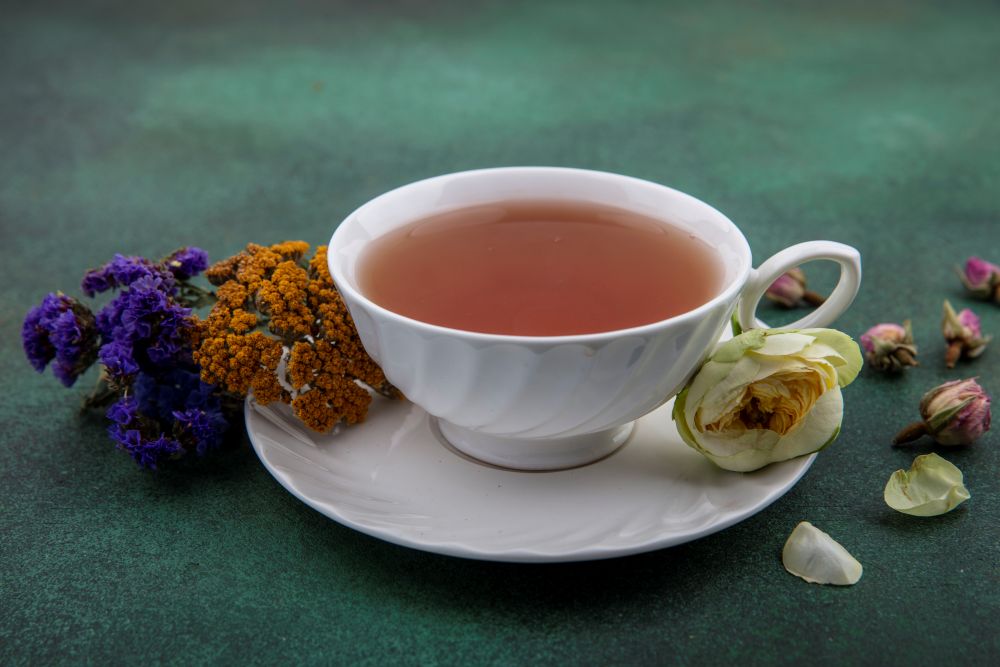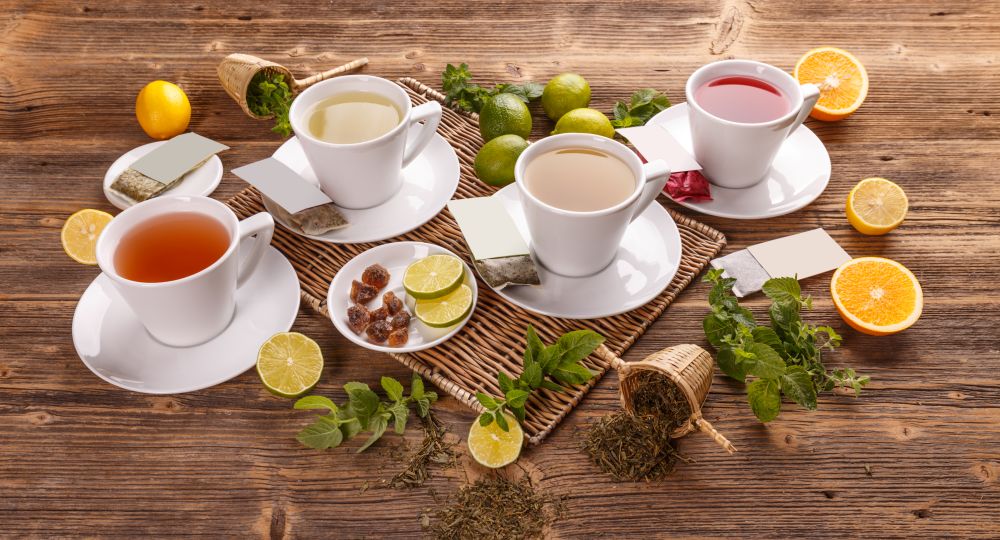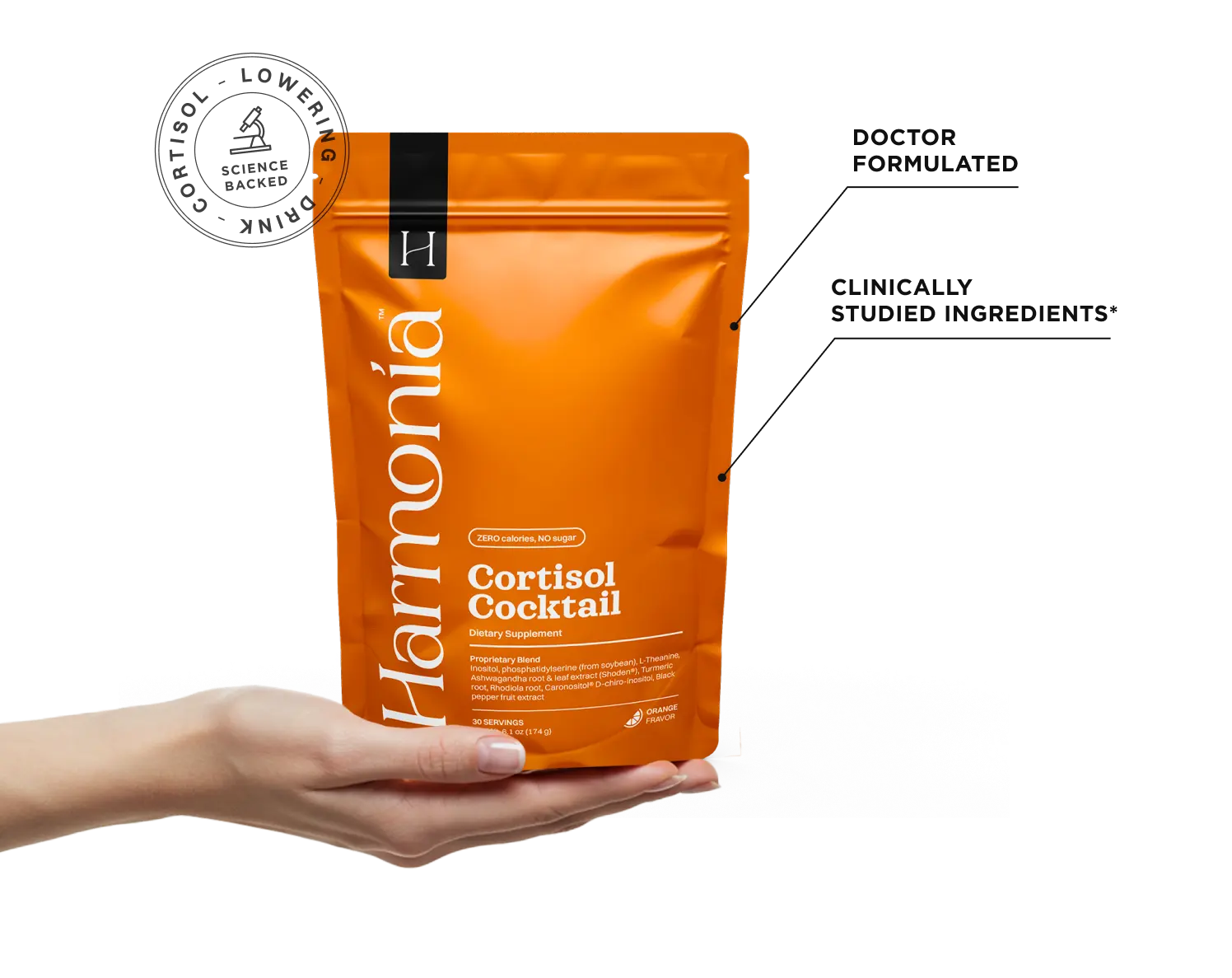Stress is more than just a feeling — it’s a biological response. When your body perceives pressure or danger, it releases cortisol, often called the “stress hormone.” While short-term cortisol is useful (helping you wake up, stay alert, or respond to a challenge), constantly elevated cortisol can wreak havoc on your body.
Women in particular often feel the effects of high cortisol: trouble sleeping, weight gain, anxiety, mood swings, cravings, and hormonal imbalances. No wonder so many are searching for natural ways to bring this stress hormone back into balance.
That’s where tea comes in. Throughout history, people have relied on calming herbs to reduce stress and restore equilibrium. The best tea to reduce cortisol combines soothing botanicals and adaptogenic herbs for cortisol, giving your body the nutrients it needs to reset.
Cortisol and Stress
Cortisol is a hormone produced by the adrenal glands, and it plays a critical role in keeping your body in balance. It regulates blood sugar, manages inflammation, supports focus and energy, and even helps control your sleep–wake cycle. Most importantly, it’s your built-in alarm system, preparing your body to respond to stress.
In a healthy rhythm, cortisol rises in the morning to help you wake up alert and ready for the day, then gradually tapers off in the evening so you can wind down and rest. But today’s lifestyle doesn’t always allow that natural cycle to flow. Late nights on screens, constant notifications, caffeine overload, and processed foods can all push cortisol levels higher than they should be — and keep them there.
Symptoms of high cortisol include:
- Fatigue that doesn’t improve with rest
- Feeling “tired but wired” at night
- Brain fog and poor focus
- Increased belly fat or carb cravings
- Mood swings and irritability
- Disrupted menstrual cycles or PCOS flare-ups
- Difficulty falling asleep or staying asleep
If these symptoms sound familiar, you’re far from alone. Research suggests that most women experience stress-related hormonal imbalance at some point in their lives. The good news?
Lowering cortisol naturally can make a powerful difference — and starting with something as simple as tea is one of the gentlest and most effective steps.
Can Tea Really Help Lower Cortisol?

The short answer is yes — the right teas can make a meaningful difference in regulating stress hormones.
What makes them so powerful is the way their natural compounds interact with both the nervous system and the endocrine system, helping the body shift from a constant “fight or flight” state back into balance.
- Adaptogenic herbs for cortisol (like ashwagandha or rhodiola) help the body adapt to stress and restore balance.
- Relaxing herbs (like chamomile or lemon balm) calm the nervous system, signaling your body to slow cortisol production.
- Nutrient-rich teas (like green tea or turmeric) provide antioxidants that reduce inflammation linked to stress.
Unlike pharmaceuticals that can sometimes suppress symptoms without addressing the root, herbal teas and adaptogens work with your body in a gradual, holistic way.
When enjoyed consistently, a daily tea ritual can reduce stress levels, improve sleep quality, and even help curb stress-driven cravings that lead to weight gain.
The Best Teas That Lower Cortisol Levels
Let’s dive into the teas and herbs most effective for supporting healthy cortisol levels.
Chamomile Tea and Cortisol
Chamomile has been used for centuries as a natural sedative and sleep aid. Research suggests chamomile can reduce anxiety and promote restful sleep — both of which help lower cortisol.
Drinking a warm cup before bed sends signals to your brain that it’s time to relax, easing the transition into deep sleep.
Best time to drink: In the evening, about 30–60 minutes before bed.
Green Tea and Cortisol
Green tea is one of the most studied teas for health — and yes, green tea lowers cortisol. The key compound here is L-theanine, an amino acid that promotes relaxation without drowsiness.
Studies show that green tea drinkers often report better focus, lower stress, and reduced cortisol levels.
Best time to drink: Morning or early afternoon, to boost focus without spiking stress.
Ashwagandha Tea (Adaptogenic Herb)
Ashwagandha is one of the most powerful adaptogenic herbs for cortisol. It doesn’t just mask stress; it helps regulate your body’s stress response at a hormonal level.
Clinical studies show ashwagandha reduces anxiety, improves sleep quality, and can significantly lower cortisol in people with chronic stress. In tea form, it’s earthy and grounding — often blended with other herbs.
Best time to drink: Morning or evening, depending on your stress patterns.
Rhodiola Rosea Tea

Known as the “golden root,” rhodiola is a favorite among herbalists for combating fatigue. It strengthens stress resilience and prevents the burnout often linked to high cortisol.
For women struggling with emotional eating or afternoon crashes, rhodiola is one of the best herbs for cortisol balance. It helps regulate appetite, stabilize mood, and keep energy steady throughout the day.
Best time to drink: Morning or midday for energy support.
Lemon Balm and Passionflower Tea
Both herbs are natural relaxants. Lemon balm soothes the nervous system, while passionflower promotes deeper sleep. Together, they make an excellent cortisol tea for nighttime use.
These herbs to lower cortisol are especially useful for women who feel restless or anxious in the evenings.
Best time to drink: Before bed, to support sleep and nighttime cortisol regulation.
Turmeric Tea
Turmeric isn’t just for cooking. This golden spice reduces inflammation — and since inflammation and stress are linked, turmeric indirectly helps lower cortisol.
Turmeric also supports insulin sensitivity, which is important because high cortisol and blood sugar issues often go hand in hand.
Best time to drink: Afternoon or evening, ideally after meals.
Herbs for Cortisol: Which Works Best?
Not all herbs affect cortisol in the same way, and understanding their differences can help you choose the right support for your body. Some are deeply calming, gently quieting the nervous system and promoting rest, while others are energizing adaptogens that build resilience and prevent stress-related fatigue.
Herbs that decrease cortisol include ashwagandha, rhodiola, chamomile, lemon balm, passionflower, and green tea with its calming compound L-theanine. These herbs work in different ways — from lowering anxiety and improving sleep to supporting long-term hormonal balance and stress adaptation.
On the other hand, herbs that may increase cortisol are usually those with a high caffeine content, such as guayusa or yerba mate. While they can boost alertness, they may also cause overstimulation and temporarily raise cortisol in sensitive individuals.
Finding the right balance depends on your stress type. If you struggle with evening restlessness or poor sleep, calming herbs like chamomile and lemon balm can help. If daytime fatigue and emotional eating are your main challenges, adaptogens such as ashwagandha and rhodiola may be more effective.
This is also why many women choose Harmonia’s Cortisol Cocktail — it combines several of these proven herbs, like ashwagandha, rhodiola, turmeric, and L-theanine from green tea, into one refreshing daily drink.
Lifestyle Tips to Support Cortisol Balance

Even the best herbs for cortisol work best when paired with healthy lifestyle habits. Small, consistent changes can significantly improve your body’s ability to regulate stress hormones and prevent cortisol from staying elevated. Here are simple yet powerful ways to enhance results:
- Prioritize quality sleep: Aim for 7–9 hours per night, and try to go to bed and wake up at consistent times. Deep, restorative sleep is when your body naturally lowers cortisol and restores balance. Avoid screens an hour before bed and create a calming bedtime routine with tea or Harmonia for extra support.
- Eat nutrient-dense meals: Balanced meals rich in protein, healthy fats, and fiber help stabilize blood sugar, which in turn prevents cortisol spikes. Include foods high in magnesium (like leafy greens and nuts) and vitamin C (like citrus and berries), both of which play roles in stress regulation.
- Move daily: Gentle forms of exercise such as yoga, stretching, walking, or light strength training help lower stress hormones and boost endorphins. Intense exercise can temporarily raise cortisol, so listen to your body and focus on sustainable movement that makes you feel energized rather than drained.
- Manage stress mindfully: Incorporating practices like meditation, breathwork, journaling, or spending time outdoors can shift your body into a parasympathetic (“rest and digest”) state. Even 10 minutes of mindfulness a day has been shown to lower cortisol levels and improve mood.
- Hydrate well: Dehydration can act as a stressor on the body, leading to higher cortisol and fatigue. Aim for at least eight glasses of water a day, and consider herbal teas or cortisol-supportive drinks like Harmonia to stay hydrated while calming your stress response.
- Limit stimulants and alcohol: Too much caffeine or alcohol can disrupt sleep and push cortisol higher. Swap your afternoon coffee for green tea or a cortisol-lowering herbal option to maintain calm energy without overstimulation.
- Nurture social connections: Healthy relationships act as a buffer against stress. Spending time with supportive friends or family members can lower cortisol and improve emotional resilience.
By combining these lifestyle strategies with calming teas or Harmonia’s cortisol-lowering blend, you create a well-rounded approach to stress management that supports both immediate relaxation and long-term hormonal balance.
Conclusion – Finding the Best Tea to Reduce Cortisol for You
The best tea to reduce cortisol depends on your needs. Chamomile and lemon balm shine at night, green tea boosts calm focus during the day, and adaptogens like ashwagandha and rhodiola offer powerful long-term balance.
But if you’re looking for something more effective than traditional teas, Harmonia’s Cortisol Cocktail delivers a smarter, science-backed solution. With a refreshing orange taste and clinically studied ingredients, it’s the easiest way to lower stress hormones, improve sleep, and restore balance.
Ready to take control of stress and feel calm again? Take the quiz today and discover how Harmonia can help you lower cortisol naturally.
References
- Almudhi, A., & Gabr, S. A. (2022). Green tea consumption and the management of adrenal stress hormones in adolescents who stutter. Biomedical Reports, 16(4), 32. Link.
- Bachour, G., Samir, A., Haddad, S., Houssaini, M. A., & El Radad, M. (2025). Effects of Ashwagandha Supplements on Cortisol, Stress, and Anxiety Levels in Adults: A Systematic Review and Meta-Analysis. BJPsych Open, 11(S1), S39-S39. Link.
- MahaNaseer, M. S., Abdullah, M., Mutahir, M., Riaz, A., Khalid, I., Mumtaz, H., ... & Pakistan, P. (2022). Explore the therapeutic potential of Chamomile and lavender in the management of cortisol levels and blood Pressure. NEUROQUANTOLOGY, 20(12), 61-69. Link.
- Wieczorek, K., Targonskaya, A., & Maslowski, K. (2023). Reproductive hormones and female mental wellbeing. Women, 3(3), 432-444. Link.







